First out of the gate, on March 19th, was the blockbuster hit. Porky's cost $4 million to make. In the US alone, within 4 months of release, it took $104 million. Today those numbers would put the widest of grins on a studio executives face, but in 1982 terms they were staggering. Porky's was the fifth biggest box office hit of the year and a genuine cultural moment.
Next up, on July 30th, was The Last American Virgin, which opened to little fanfare and limited box office, taking just $5.8 million. Its success would grow slowly, until it would become a cult favourite and one of the best regarded, most quietly influential teen movies of its decade.
On August 13th the third of this important group of films arrived. Fast Times At Ridgemont High cost $4.5 million and took a respectable $27 million, enough to win it a short lived TV adaptation. It got strong reviews, but Fast Times' significance lies as much in the talent behind and in front of the camera as it does in the debt of inspiration the whole of the 80s teen movie cycle owes it. It was a talent farm, growing many people we'd meet multiple times in 80s teen cinema.
Films come and go. Big hits can vanish into cultural irrelevance. Flops can grow to outshine their initial reception many times over. These three films, whatever their level of success in 1982 and whatever the degree to which they hold up today, are culturally important. Between them they all but codified the conventions of the teen sex comedy. Today though, for its 35th birthday, we're going to look at Fast Times.
Of the three key teen movies of 1982, Fast Times At Ridgemont High has aged best. Viewed in the context of the other two it could seem to be a refinement of their themes, especially those of The Last American Virgin, with which it shares enough similarities that several people have mistaken Virgin for a Cannon films ripoff of Fast Times. Of course there is the possibility that Lemon Popsicle served as some inspiration for this film but this seems unlikely, as they had a more interesting source on which to base the film.
The film follows a year at the titular school, covering a number of students and their experiences. Crowe's screenplay hits several of the expected beats. There's the tentative romance as terminally nice Mark Ratner (Brian Backer) pursues Stacy Hamilton (Jennifer Jason Leigh), only to initially be outdone by his friend Mike Damone (Robert Romanus), who gets Stacy pregnant and bails on her when she needs an abortion. Stacy's brother Brad (Judge Reinhold), a senior, dumps his girlfriend, but then finds his objective – having his freedom so he can enjoy the best year of his life before he heads off to college – doesn't exactly go to plan. Brad is also nursing a crush on Linda (Phoebe Cates), Stacy's more experienced friend who, as Damone does for Rat, dispenses 'sage like' advice to Stacy. Around these central threads spin a series of fun, more broadly comic incidents, generally involving stoned school slacker Jeff Spicoli (Sean Penn) and his buds. Spicoli's nemesis is American history teacher Mr Hand (Ray Walston), who consistently berates Spicoli for wasting his time, leading to some of the film's funniest moments.
Like The Last American Virgin, Fast Times At Ridgemont High mixes sex comedy and stoner jokes with a very serious side and a surprisingly realistic look at teenagers' own view of their coming of age experiences. While Virgin can often grind its gears during shifts between its serious and comedic sides, Crowe's screenplay smoothes the transitions in mood, doing a much better job of making the changeable tones feel cohesive.
Crowe and director Amy Heckerling's deft mix of the comedic, the dramatic and sometimes the tragic, is seen most clearly in Stacy's story. Stacy is played as a typical fifteen year old girl; lacking experience, curious about the sexual experiences her friend Linda has already had and anxious both to learn and have those experiences for herself. Crowe and Heckerling often play this for broad comedy, as in the scene in the school cafeteria in which Linda, using a carrot, shows Stacy how to give a blowjob and Stacy's clumsy attempt draws mocking applause when it's spotted.
Stacy and Rat's tentative on off romance is also largely played for laughs. Their first date is one of the film's funniest sequences. Damone has advised Rat to play the first side of Led Zeppelin 4 in the car when he picks up Stacy. Crowe knew the guys from Zeppelin from his days with Rolling Stone, but was unable to license anything from 4. Instead, as Stacy and Rat are driving to their date, we hear Kashmir on the stereo. This solution actually makes the scene funnier and more character appropriate than it would be if Crowe had been able to secure, say, Black Dog. The scene plays as if Rat has made a mistake, which suits his character better; he's forever trying hard, but not quite getting it right, in this case playing a track from Physical Graffiti rather than from 4. It's also a great joke because of what Kashmir sounds like. The strings hold a foreboding menace that plays on the nerves, accentuating how Rat must be feeling. This gag is carried through in the design of the restaurant that Rat and Stacy go to, where everything seems huge, purposely designed at Heckerling's request to dwarf Rat and Stacy, making them look like the kids they are trying hard not to be.
As much as Stacy is concerned with romance, her overriding curiosity and that of most of the characters in the film is about sex. Many of the American teen movies of the 80's see sex as something that girls allow to be done to them, rather than something they actively take an interest in, Fast Times differs in this respect. Stacy pursues sex with gusto, she goes after it first with a much older and more experienced man, then with Damone, a guy her own age who gets there first largely because he's more honest about what he wants than his nervy friend Rat. It would be easy to show Stacy's pursuit of sexual experience as something wholly positive, or to depict her as somehow immoral for her curiosity and desire (The Last American Virgin veers more towards the latter path). Crowe and Heckerling, however, take a more nuanced approach.
Fast Times is marked by a sexual frankness malleable enough to be both dramatic and funny, but it is also more respectful to its female cast than many of the teen films of this period, which were filled with completely gratuitous nudity (see Tomboy for some especially ill thought out examples). There is plenty of nudity, but the two female characters who are exposed – Stacy and Linda – are perhaps the film's two most developed and realistic individduals. With just one exception, the nudity takes place during sex scenes, and feels like part of the film's commitment to not sugarcoating its content. The bulk of the nudity seems designed to put us inside the awkwardness of Stacy's early sexual experiences. Look at the way Leigh holds herself in the second scene, at first showing off, then repositioning, slightly embarrassed. This intent is clarified with the one nude scene that occurs outside this context.
The exception comes in the scene of Cates getting out of the pool and removing her bikini top. This is one of the iconic images of 80's cinema as a whole, perhaps the trigger moment for an entire generation of guys coming of age, but it is interesting beyond its titillating nature. This scene is the product, within the story if not from behind the camera, of a male gaze, but it's clearly a fantasy and, importantly, a fantasy immediately undercut when Linda catches Brad masturbating in the bathroom. Yes, the film has its cake and eats it, but it's not endorsing Brad's image of Linda (indeed it shows Linda recoiling when she bursts in on him) and neither does it, unlike many of the films that predate it or would follow in its footsteps, eventually allow Brad to fulfill his masturbatory fantasies. One suspects, however, that these subtleties were lost on a 13 year old boy with a rented VHS and a pause button.
The film's coming of age focus pivots around Stacy. Linda learns a few lessons, Brad learns that he was a presumptuous dick in breaking up with his girlfriend and Rat, via Stacy, gets to do some growing up of his own, but it is Stacy we see go through all the most important milestones of young adulthood and deal with their consequences.
A witty screenplay is a good start for a teen comedy but it goes only so far; casting is key. Fast Times may have the most accomplished cast ever to grace an American teen movie. The sheer amount of talent, of people who would go on to work of importance and quality, is staggering, ranging from the leads to people glimpsed in the background of one or two scenes.
Perhaps the most notable of these talents is future two time Oscar winner Sean Penn, playing far against the type we have come to expect of him, as perpetually stoned surfer dude Jeff Spicoli. Penn was no less method in this role than he is as a matter of course. Throughout filming he insisted that the cast, crew and even his parents, with whom he still lived, refer to him as Spicoli. Spicoli is perhaps the quintessential dumb, stoned, surfer character. He became a model for a whole generation of characters – you could imagine the process of creating Bill and Ted as little more than splitting Spicoli into two bodies and handing each a guitar. Penn is fantastic, taking what is not a key role in terms of what loose story Fast Times has and, aided by Crowe's insanely quotable dialogue, making it the iconic thing to come out of the film.
The only other purely comedic element of the film, which otherwise weaves its laughs organically into its drama, are the repeated sequences of Brad's travails at his various jobs. At first he's smug, he's attained high status as an assistant manager at All American Burger. The hilarious sequence in which he loses that job - "Mister if you don't shut up I'm gonna kick one hundred percent of your ass" - contains several of the film's best lines, while a later job, delivering for a fast food fish and chips place, has one of the film's best visual gags (which also features a cameo by Crowe's wife, Nancy Wilson).
The cast is jam-packed with quality names in small roles. Nicolas Cage, a runner up for the leading role of Brad, largely by dint of the fact he was still just 17, pops up in the background of a few scenes. Eric Stoltz and Anthony Edwards play Spicoli's buddies, Forest Whitaker makes a huge impression with a single line and Vincent Schiavelli is hilarious as Mr Vargas, who entreats his class to “Have a heart, I just switched to Sanca”. There are also early parts for Kelli Maroney, who went on to post-apocalyptic teen zombie comedy Night of the Comet, Bruce Springsteen's sister Pamela, who took the lead in a Sleepaway Camp sequel and Amanda Wyss, who may be best known for A Nightmare on Elm Street, but who I love in the hilarious Better Off Dead. Some of the main cast ultimately went on to smaller careers. Judge Reinhold, excellent as Brad, had a great 80s career, largely outside the teen movie cycle, but faded in the 90s and has largely been seen in TV and direct to video movies in the past decade, while Backer (who last showed up in Heckerling's Vamps) and Romanus are little seen these days.
I have to declare an interest here: I think Jennifer Jason Leigh is, at a minimum, the best American actress of her generation. Fast Times At Ridgemont High was for her, as it was for so many of the young cast, something of a launchpad. Leigh has a well founded reputation as one of cinema's most dedicated exponents of research and pre-shoot character work. Here she appears to have taken it comparatively easy on herself, merely writing her usual in character journal and getting a job in the exact pizza parlour we see Stacy working in in the film's opening scene. If Linda is a naive character who has convinced herself that she is worldly then Stacy is much more aware of her lack of experience and, typically of the teenage girls of 80s movies, anxious to shed it. This became the crux of a problem the late, great, Roger Ebert had with the film in his contemporary review. Ebert decried the film for putting an actress as 'pure and innocent' as Leigh through the various experiences that Stacy goes through in the film, and for exploiting her nudity in those situations.
Stacy is an innocent, naive, vulnerable teenager. She is often exploited. Jennifer Jason Leigh was a teenager when Fast Times was made but there, it would seem, the similarities between her and Stacy end. Leigh comes across, in the few interviews she elects to do, as a fiercely intelligent, thoughtful and very private woman who is dedicated to her work. She has never appeared to be a naif of any kind. The other thing that has always been clear about Leigh is that her dedication to acting is backed up with a fearlessness about exposing herself, in either an emotional or a physical sense. What is both shocking about Ebert's review and proof of Leigh's brilliance in this part and as an actress overall is that the critic has seemingly confused the actress with her role; he reviews Fast Times as though Leigh were Stacy, rather than playing a role. That's how convincing her illusion is. In commenting on Ebert's review on the DVD commentary track, director Amy Heckerling notes that, if anything, Fast Times failed to go far enough for Jennifer Jason Leigh's liking.
I've talked about Fast Times At Ridgemont High largely in parts. The fact I love this performance, why that scene works, but that's slightly missing the point. I could break this film down to its every constituent part, to bits in the background of scenes (the two girls who both dress like Pat Benetar, for instance), to individual scenes like Brad looking in the "Big Hairy Pussy" mirror or the little glimpse of Damone's best side as he rings round trying to get money for Stacy. A lot of teen comedies work this way, they are a collection of scenes and moments, you can almost see the cards on the screenwriter's board, moving around because there hasn't been a really big laugh for fifteen pages. Fast Times works like that to a degree, but it's also more cohesive, the scenes add up to something. We've discussed Stacy's journey, but the payoff for Spicoli has it's own peculiar emotional charge ("Aloha, Spicoli") and Brad's arc, while small, is another realistic and interesting one. More even than that though, it all works as a whole piece. Crowe and Heckerling keep everyone's stories in focus, they give them all enough screentime to pay off in a satisfying way. Most of all it works because I believe it, it's heightened, but I can see these events being part of a typical school year, I went to school with people like this and I believe them as each other's friends and peers.
Great films don't always happen by design. Fast Times At Ridgemont High feels like a particularly special and inexplicable piece of alchemy. All the right people happened to be in the right place at the right time. There's not one role that feels as though it could be cast better (Brad, for instance, needs the regular guy vibe that Judge Reinhold has, not Nicolas Cage's weirdness). All the jokes hit, all the drama connects. It says something to and about its audience without feeling preachy or sentimental. That's why this film endures, the fashion and the soundtrack may have dated, but the characters and their situations are as real today, as present in our high schools, as they were in 1982.
Fast Times At Ridgemont High is a key film in the history of teen cinema. In Cameron Crowe and Amy Heckerling it established the careers of people who would make further key contributions to the genre, in its cast it gave us a generation of actors who would, ultimately, be more important and do more interesting work than many of the 'Brat Pack', who would come to prominence partly through the films of John Hughes. It also influenced a huge amount of films that would come after it, and along with Porky's and The Last American Virgin, kickstarted a decade in which teen narratives would almost come to dominate American cinema. The films Fast Times influenced didn't always learn the right lessons from the three key teen movies of 1982, but good, bad or indifferent, many of them would play around with their influences in interesting ways and bring to the screen a depiction of teenage life and concerns that was absolutely rooted in its time and place.

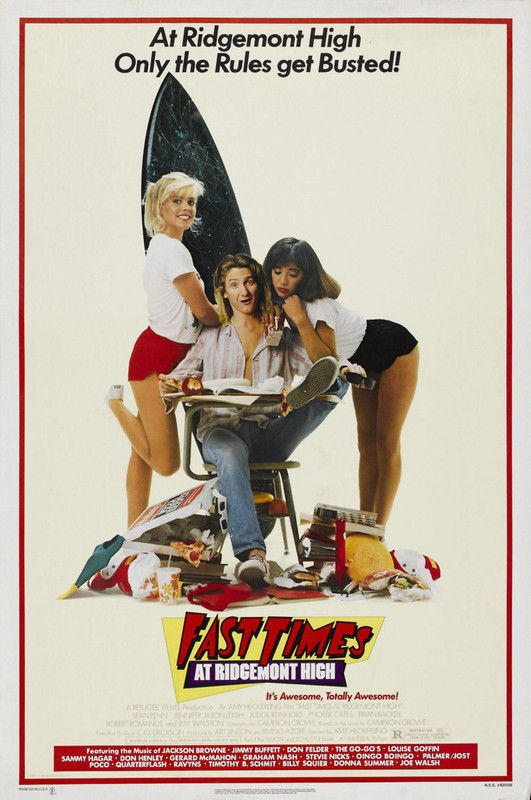
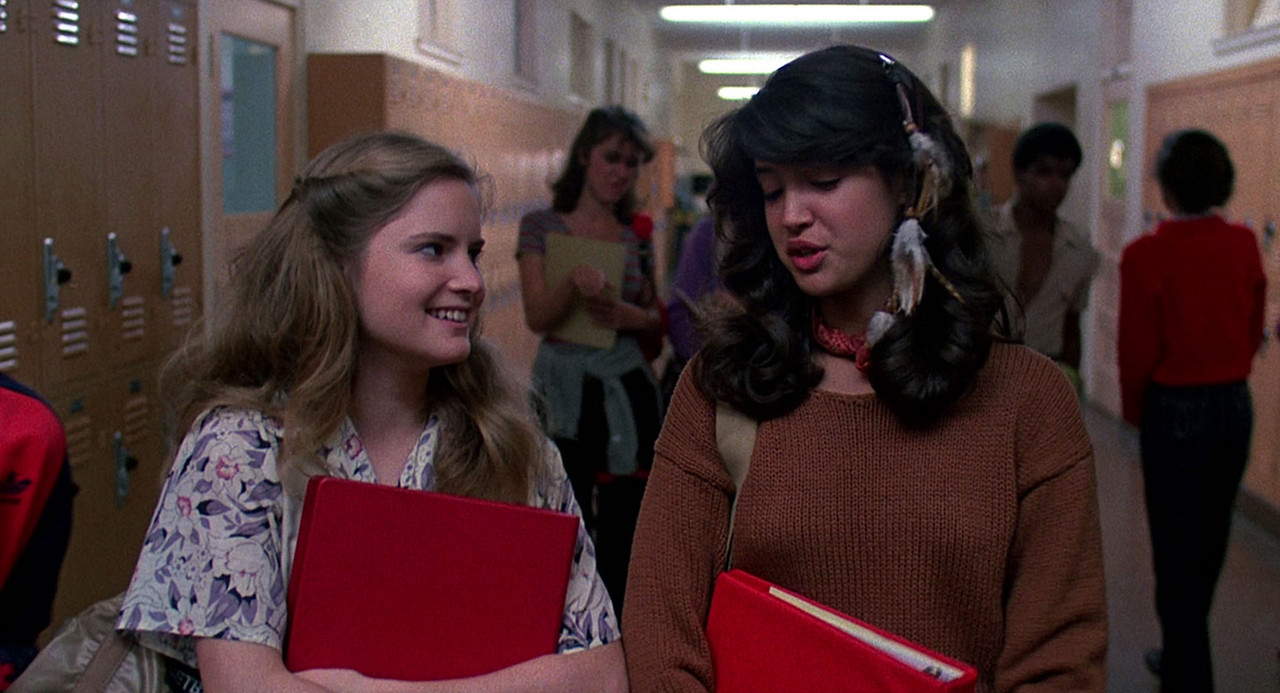
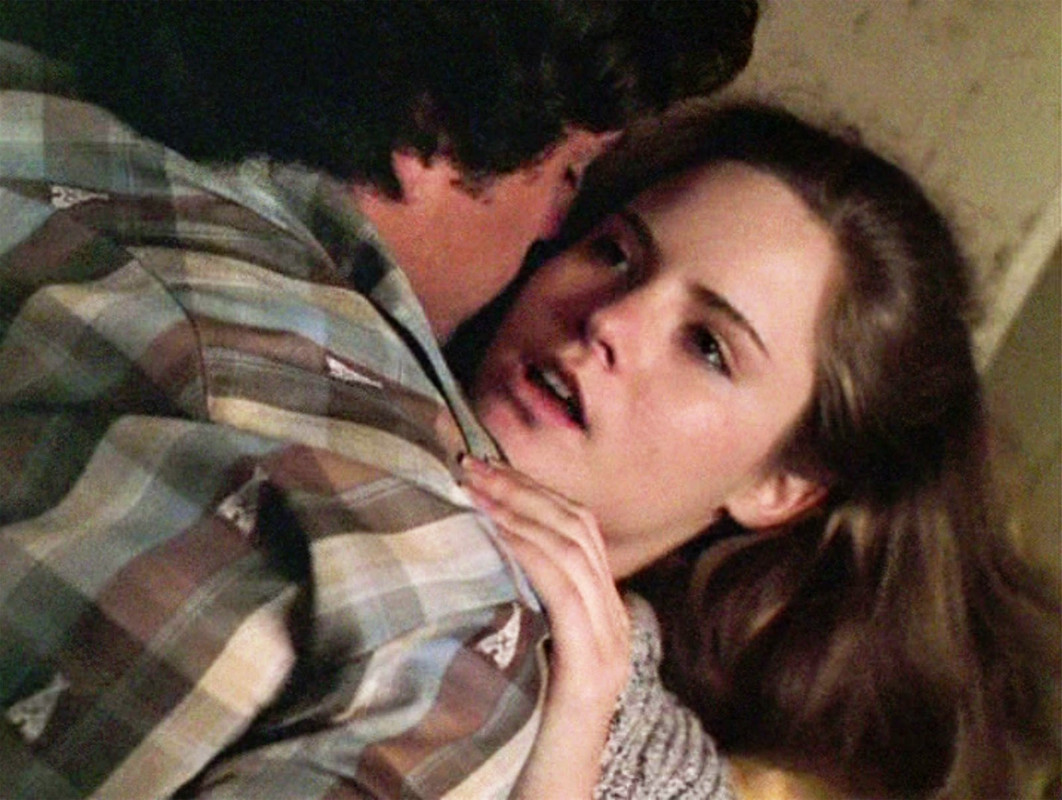
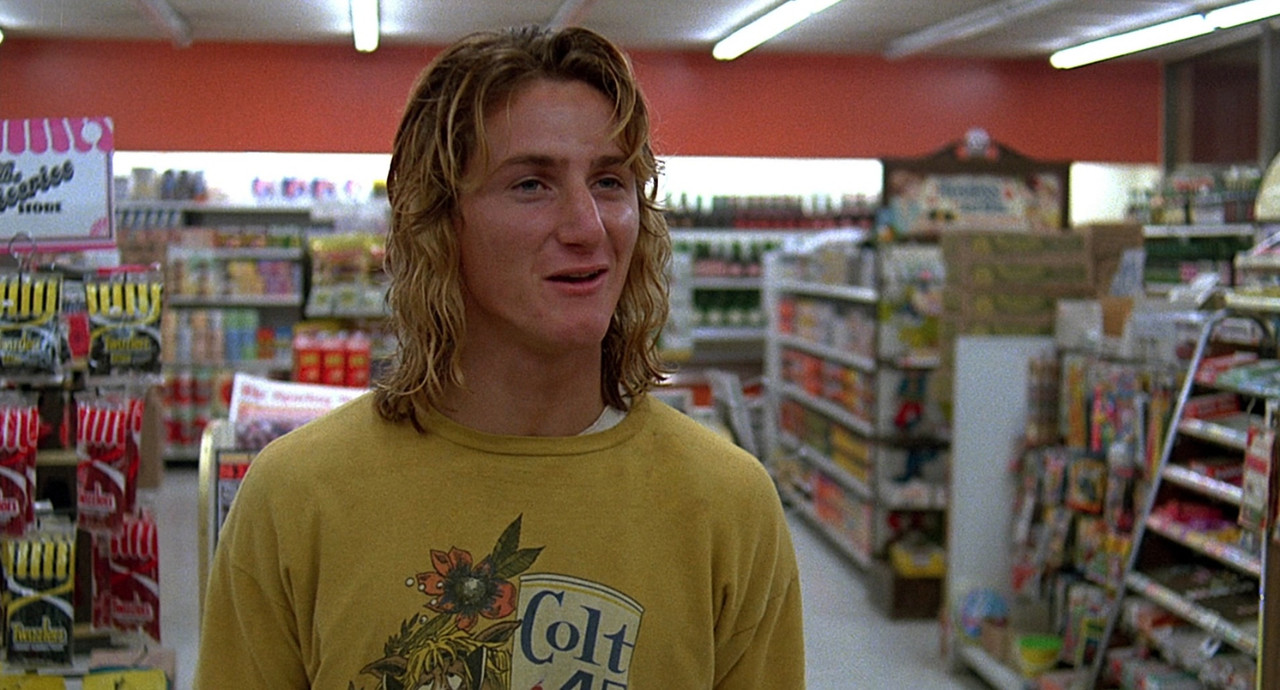
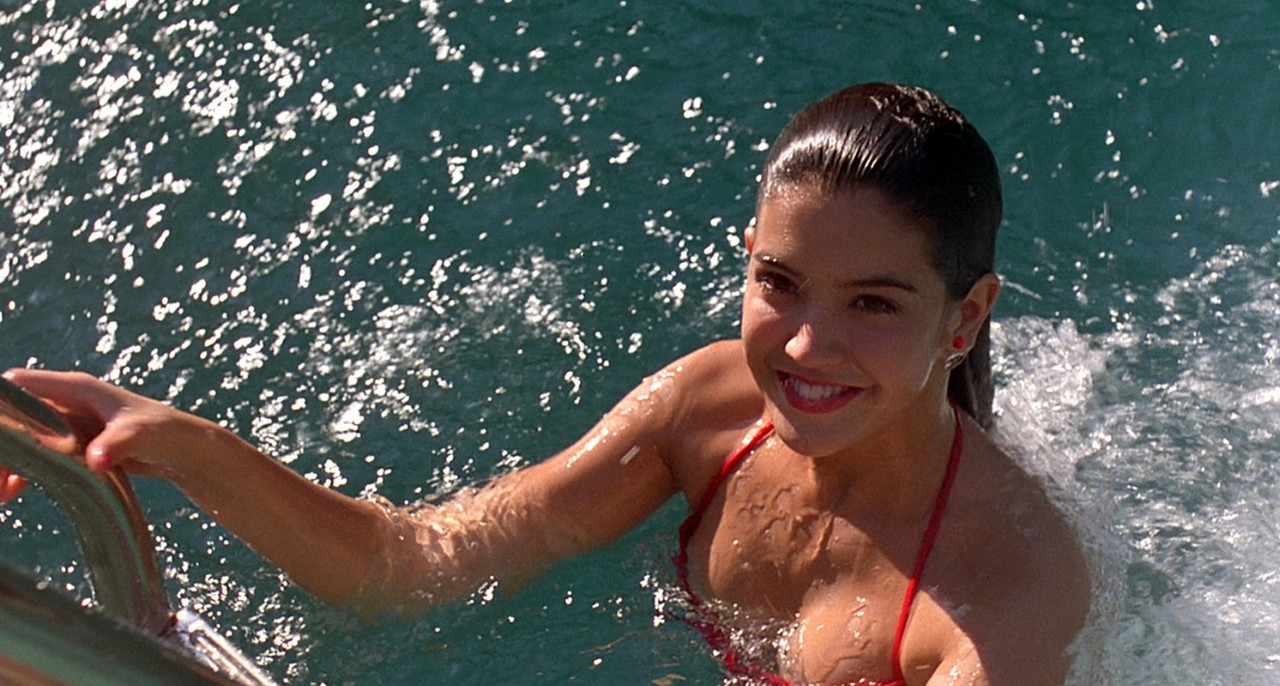

No comments:
Post a Comment